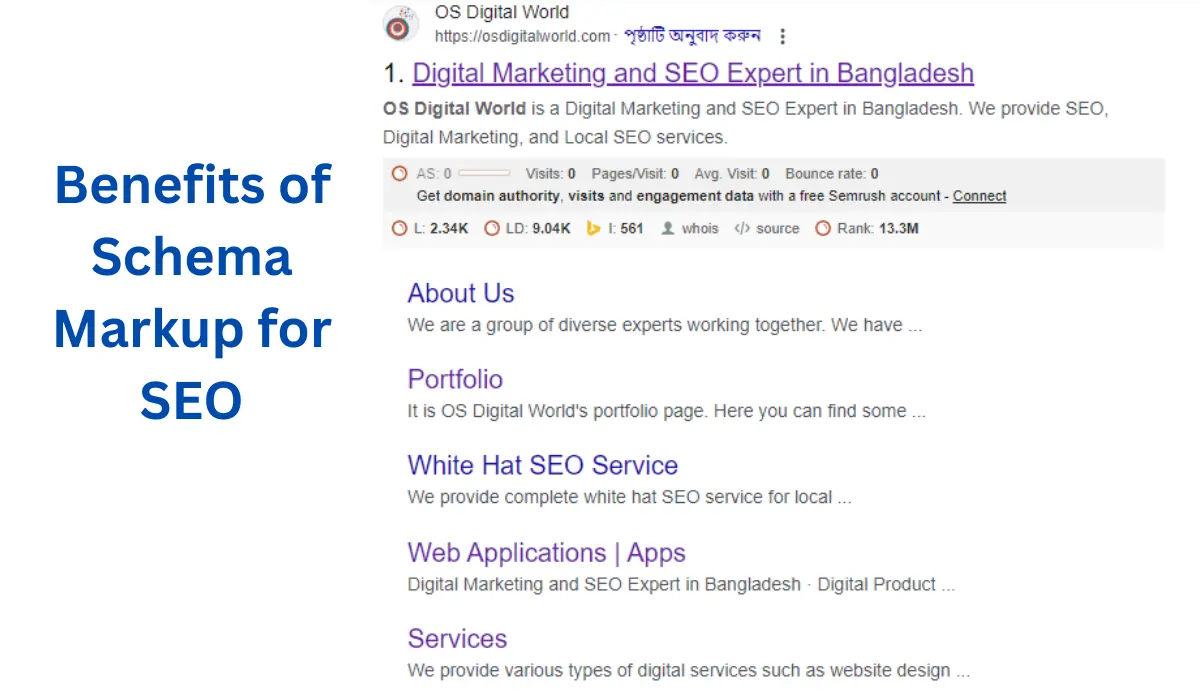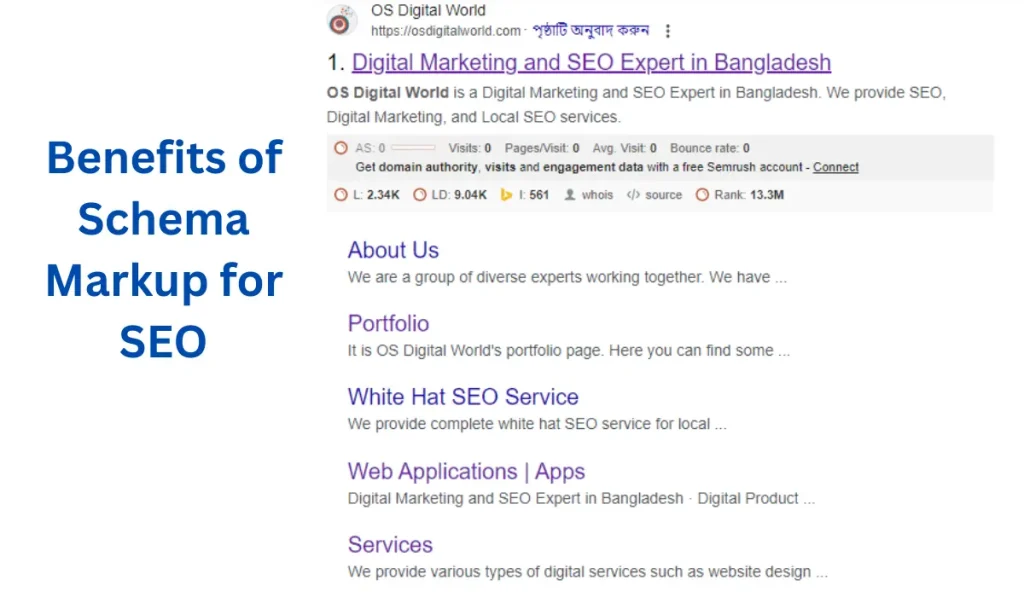In the realm of digital marketing, where every click counts and visibility is paramount, harnessing the power of schema markup has become indispensable. Schema markup, a form of structured data, holds the key to unlocking enhanced search engine optimization (SEO) performance. By providing search engines with context about website content, schema markup enriches search results, boosts click-through rates, and ultimately elevates the overall SEO strategy. Let’s delve deeper into the myriad benefits of schema markup for SEO.
Benefits of Schema Markup for SEO
In the ever-evolving landscape of SEO, schema markup emerges as a game-changer, offering a multitude of benefits that enhance visibility, engagement, and overall performance. From enriched search results and improved click-through rates to enhanced user experience and competitive advantage, schema markup empowers websites to rise above the noise and connect with their target audience effectively. As search engines increasingly rely on structured data to deliver relevant results, embracing schema markup is not just a choice but a strategic imperative for businesses seeking to thrive in the digital era.
Enhanced Visibility in Search Results:
Imagine your website content standing out prominently amidst a sea of search results. Schema markup makes this vision a reality by enabling rich snippets – those informative snippets that appear beneath search results. Whether it’s a star rating for a product, a recipe’s cooking time, or event details, schema markup empowers search engines to display key information directly in search results, making your listing more enticing to users.
Improved Click-Through Rates (CTRs):
In the competitive landscape of digital marketing, winning the click is half the battle. Schema markup gives your website an edge by increasing its visibility and attractiveness in search engine results pages (SERPs). Studies have shown that listings with rich snippets enjoy higher click-through rates compared to plain text listings. By providing users with pertinent information upfront, schema markup entices them to click through to your website, driving organic traffic and enhancing overall engagement metrics.
Better Understanding of Content:
Search engines are constantly striving to deliver the most relevant results to users’ queries. Schema markup facilitates this process by providing search engines with context-rich metadata about your content. Whether it’s a product description, a recipe ingredient list, or a business address, schema markup helps search engines understand the meaning and significance of your content, ensuring that it gets surfaced to users searching for relevant information.
Enriched User Experience:
In the digital landscape, user experience reigns supreme. Schema markup contributes to a seamless and enriched user experience by delivering precise and relevant information directly in search results. Whether it’s finding the right recipe, booking tickets for an event, or making a purchase decision, schema markup empowers users to make informed choices without having to navigate away from the search results page, thereby streamlining the user journey and enhancing satisfaction.
Competitive Advantage:
In the fiercely competitive world of online business, staying ahead of the curve is imperative. By embracing schema markup, you gain a competitive advantage by distinguishing your website from competitors and capturing users’ attention with rich, informative snippets. Moreover, as search engines continue to prioritize structured data in their algorithms, investing in schema markup today ensures that your website remains visible and competitive tomorrow.
Common Schema Markup Types
Common schema markup types encompass a diverse array of structured data categories that help search engines understand and display content more effectively in search results. Here are some of the most prevalent schema markup types:
Article:
Used to markup news articles, blog posts, and other editorial content, including details such as headline, author, publication date, and article body.
Product:
Ideal for e-commerce websites, this schema type enables the markup of individual products, including product name, description, price, availability, and reviews.
Recipe:
Designed for recipes, this schema type includes details such as recipe name, ingredients, cooking time, nutrition information, and user ratings.
Event:
Used to markup events such as concerts, conferences, or festivals, including event name, date, location, organizer, and ticket information.
Organization:
Enables the markup of organizations, businesses, and other entities, including details such as name, logo, contact information, and social media profiles.
Local Business:
Specifically for local businesses, this schema type includes information such as business name, address, phone number, opening hours, and reviews.
Review:
Allows the markup of reviews for products, services, or businesses, including details such as reviewer name, rating, review text, and date.
FAQ Page:
Ideal for frequently asked questions pages, this schema type enables the markup of questions and answers, enhancing the visibility of FAQs in search results.
Breadcrumb List:
Used to markup breadcrumb navigation links, providing search engines with a hierarchical structure of a website’s pages.
Video Object:
Designed for video content, this schema type includes details such as video title, description, duration, thumbnail URL, and upload date.
Book:
Used to markup books, including details such as book title, author, publication date, ISBN, and reviews.
Person:
Enables the markup of individuals, including details such as name, job title, image, social media profiles, and contact information.
Website:
Allows the markup of a website’s homepage, including details such as site name, URL, description, and organization or person associated with the website.
Software Application:
Enables the markup of software applications, including details such as name, description, operating system requirements, and download links.
These are just a few examples of the many schema markup types available. Depending on the nature of your website and content, you can choose the most relevant schema types to implement, ensuring that search engines can understand and display your content accurately in search results.
Schema Markup for Rich Snippets
Schema markup for rich snippets is a powerful tool in the arsenal of SEO practitioners, enabling them to enhance the appearance of search engine results and attract more clicks from users. Rich snippets are the additional pieces of information displayed alongside traditional search results, providing users with more context and increasing the visibility of your content. Let’s explore how schema markup facilitates the creation of rich snippets and the benefits it offers:
Understanding Rich Snippets: Rich snippets are snippets of information that appear in search engine results pages (SERPs) beyond the traditional blue link and meta description. They can include elements such as star ratings, review counts, product prices, event dates, recipe cooking times, and much more. Rich snippets make search results more informative and visually appealing, helping users make quicker decisions about which search results to click on.
How Schema Markup Enables Rich Snippets: Schema markup, also known as structured data, provides a standardized way to annotate web content, helping search engines understand its context and meaning. By adding schema markup to your HTML code, you can explicitly specify the type of content on your webpage and provide detailed information about it. Search engines use this structured data to generate rich snippets that appear in search results.
Also Read
Advanced Schema Markup Techniques
Advanced schema markup techniques go beyond basic implementations and involve more sophisticated strategies to enhance the visibility and relevance of your content in search engine results. Here are several advanced schema markup techniques:
Implementing Dynamic Schema Markup:
Instead of static schema markup, dynamic schema markup involves generating structured data dynamically based on user interactions or database content. This technique is particularly useful for websites with frequently updated content, such as news portals, e-commerce platforms, or real-time data-driven applications. By dynamically generating schema markup, you ensure that search engines receive the most up-to-date and relevant information about your content.
Leveraging Nested Schema Types:
Nested schema types involve nesting one schema type within another to provide more granular detail about specific aspects of your content. For example, within a “Product” schema, you can nest schemas for individual product reviews, offers, and aggregate ratings. This allows search engines to better understand the relationships between different elements of your content and display more comprehensive rich snippets in search results.
Incorporating Sitelinks Search Box Schema:
The Sitelinks Search Box schema enables search engines to display a search box directly within search results, allowing users to conduct site-specific searches without visiting the website. By implementing Sitelinks Search Box schema markup, you make it easier for users to find relevant content on your website directly from search results, enhancing user experience and engagement.
Utilizing Schema Extensions:
Schema.org provides standard schema types for various content categories, but you can also create custom schema types using schema extensions. Schema extensions allow you to define additional properties and types specific to your industry or niche, providing search engines with more detailed information about your content. By creating custom schema extensions, you can ensure that your content is accurately represented in search results and potentially gain a competitive advantage over competitors.
Optimizing for Voice Search with Speakable Schema:
Speakable schema markup enables you to markup specific sections of your content that are suitable for voice search responses. By identifying speakable content, such as answers to frequently asked questions or concise summaries of key information, you increase the likelihood of your content being featured in voice search results. Optimizing for voice search with speakable schema markup can help you reach a broader audience and adapt to the growing popularity of voice-enabled devices.
Implementing Schema Markup for Dynamic Data:
Schema markup is often associated with static content, but it can also be used to markup dynamic data generated by web applications or APIs. For example, you can use schema markup to annotate data visualizations, interactive maps, live-streaming events, or real-time social media feeds. By implementing schema markup for dynamic data, you ensure that search engines accurately interpret and display your content, regardless of its dynamic nature.
Monitoring and Optimizing Schema Markup Performance:
Advanced schema markup techniques also involve ongoing monitoring and optimization to ensure optimal performance. Use tools like Google Search Console and structured data testing tools to monitor the implementation of schema markup on your website. Analyze rich snippet performance, click-through rates, and user engagement metrics to identify opportunities for improvement and refine your schema markup strategy accordingly.
End Words
By implementing these schema markup techniques, you can enhance the visibility, relevance, and user experience of your content in search engine results, ultimately driving more traffic and engagement to your website.





